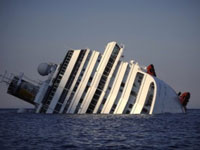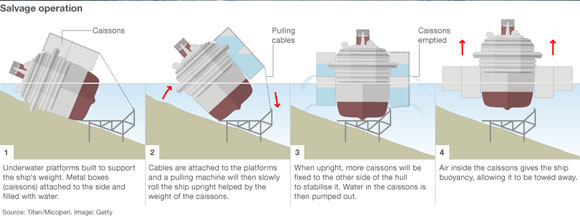 On the island of Giglio in Italy’s Tyrrhenian Sea, relatives of the 32 passengers and crew who died when the Costa Concordia crashed into rocks last year gathered today to mark the one-year anniversary of the tragedy.
On the island of Giglio in Italy’s Tyrrhenian Sea, relatives of the 32 passengers and crew who died when the Costa Concordia crashed into rocks last year gathered today to mark the one-year anniversary of the tragedy.
One year ago today, the cruise ship Costa Concordia was steered perilously close to the island, sideswiped Le Scole reef and ripped open a 150′ gash in the port side of the hull. The ship lost power, drifted and then grounded on a rocky ledge near shore. Because only the bow and the stern of the ship were in contact with the ledge, the ship rolled on its side as it grounded. The abandon ship order was not given for over an hour. Thirty two passengers and crew died as the ship rolled over to more than 80 degrees.
What has changed in a year’s time?
The ship itself is still on its side, close to where it sank and rolled over. The major change is that there are now barges and cranes alongside the stricken ship, making preparations for what will be, if successful, the largest intact salvage of any ship in history. Much of the work is currently, like the Titanic’s iceberg, mostly underwater. An undersea platform is being constructed on which the ship will be rolled upright before it is refloated and towed away. The ship originally cost $560 million to build in 2006. The cost of the salvage alone is estimated to be at least $400 million. The attempt to move the ship intact is now estimated to take place sometime toward the end of the summer.

The cruise industry has adopted a raft of new rules which they claim will make cruising significantly safer. The most significant rule change is the obvious – safety drills will now take place at the dock before the ship sails, rather than within 24 hours of sailing. The Costa Concordia sank within hours of the ship sailing from Civitavecchia, before a safety drill was performed. The rest of the rules are largely window dressing. Each concievably could help to improve vessel safety, if property implemented. Given that the captain and senior officers on the Costa Concordia appear to have largely ignored the existing rules for passenger safety, it is unclear how much difference the new rules might make.
One change that appears to have taken place is that fewer cruise ships have been passing close to islands in the maneuver known as the “inchino,” meaning salute or bow.
Shortly after the sinking, Costa Crociere chairman and CEO Pier Luigi Foschi blamed the grounding of the Costa Concordia on an ”inexplicable” error by the captain. Mr Foschi said: “This route was put in correctly. The fact that it left from this course is due solely to a manoeuvre by the commander that was unapproved, unauthorised and unknown to Costa.” He went on to say that the captain had sailed close to land to “show the ship to the port” and to “make a salute“.
In fact, the “inchino” appears to be have been a widely practiced maneuver performed by various cruise lines including Costa. It violated rules of safe navigation but was considered to be good marketing for the cruise lines After Foschi made the statement about the “manoeuvre by the commander that was unapproved, unauthorised and unknown to Costa,” people started posting vacation videos of other Costa cruise ships performing the “inchino.” Indeed, the Costa Concordia had sailed as close to the Giglio under a different captain in August of last year with Costa’s approval. Video from ships from other cruise lines demonstrated that the practice was widespread, and not limited to Costa. After sinking of the Costa Concordia, we can only hope that the “inchino” is a thing of the past.
The investigation and legal proceeding continue at a snail’s pace. The Italian Marine Casualty Investigation Central Board, the body charged with the technical investigation into the Costa Concordia casualty, has not yet produced a final report on the sinking. Captain Schettino, the first officer and four other crewmembers, as well as three members of a crisis unit set up by Costa Cruises to deal with the accident, are expected to be indicted on various charges. The indictments are not expected, however, before February.
Sadly more has the stayed the same than has changed.

I wonder if Scalping contributed to the Costa Concordia hitting the rocks!